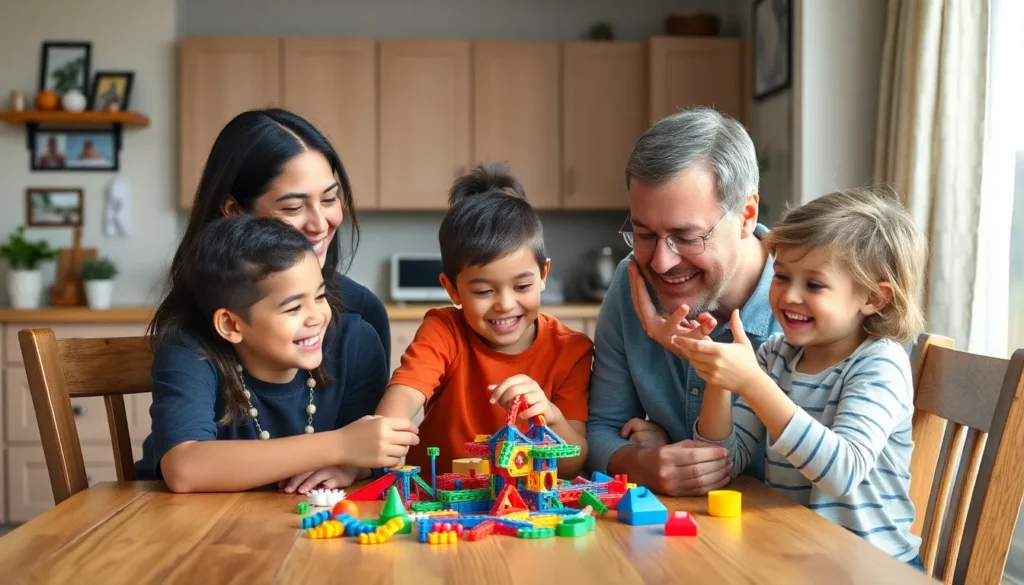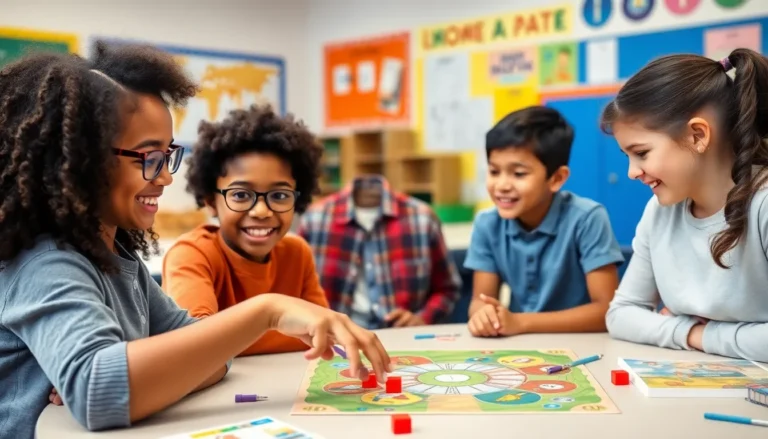Navigating the choppy waters of post-divorce parenting can feel like trying to assemble IKEA furniture without the instructions—frustrating and a little bit chaotic. Suddenly, parents find themselves juggling schedules, emotions, and a whole new set of rules. It’s not just about sharing custody; it’s about mastering the art of co-parenting while keeping the peace (and sanity).
But fear not! With a sprinkle of humor and a dash of flexibility, it’s possible to create a nurturing environment for kids amid the upheaval. This journey might not come with a roadmap, but it does come with valuable lessons, laughter, and the chance to redefine family dynamics. Embrace the adventure, because post-divorce parenting can be a wild ride filled with unexpected joys and growth.
Table of Contents
ToggleOverview of Post-Divorce Parenting
Post-divorce parenting involves navigating a complex landscape of emotions, schedules, and parenting dynamics. Parents face distinct challenges, such as establishing new routines and maintaining effective communication with their co-parent. Every transition can bring unique stressors, from scheduling conflicts to handling children’s emotions.
Children’s well-being remains the top priority during this adjustment phase. Each child might respond differently to changes, requiring parents to remain attentive and adaptable. Inconsistent routines may lead to confusion, so setting clear schedules helps children feel secure.
Co-parenting requires collaboration, even when parents disagree. Open dialogue fosters a supportive environment, promoting shared decision-making for the children’s best interests. Respect for each other’s perspectives can lead to better outcomes for the children.
Flexibility plays a crucial role. Parenting plans may need adjustments as children grow and circumstances change. Staying open-minded makes it easier to address the evolving needs of children and co-parents alike.
Humor often serves as a valuable tool. Finding light-hearted moments amid the challenges reduces tension and promotes positive interactions. This approach allows parents to bond over shared experiences, contributing to a nurturing atmosphere.
Valuable lessons often emerge from this process. Resilience develops as parents learn to navigate difficulties, fostering growth for both themselves and their children. The journey may redefine familial connections and strengthen relationships among family members.
Parents can create an enriching environment despite uncertainties. Embracing the journey with positivity and adaptability encourages a sense of stability for children, helping them thrive in their new family dynamic.
Challenges of Post-Divorce Parenting

Post-divorce parenting includes various challenges that impact both parents and children. Parents often confront these difficulties while aiming for their children’s well-being.
Emotional Impact on Children
Children experience a wide range of emotions during and after a divorce. Anxiety may surface as they adjust to new living arrangements. Sadness can emerge from loss, impacting their behavior and interactions. Some children show anger, expressing frustrations about broken family dynamics. Attention to their feelings and providing reassurance is essential. Open communication helps them articulate concerns. Parents benefit from observing behavioral changes that may indicate distress. Ultimately, a supportive environment allows children to process their emotions and adapt to the changes.
Co-Parenting Conflicts
Co-parenting conflicts often arise during post-divorce parenting. Aligning schedules can create friction between parents, making communication a crucial factor. Disagreements about parenting approaches can escalate tensions. Clear, respectful dialogue about expectations fosters understanding. Keeping children’s best interests central to discussions aids in resolving conflicts. Flexibility in arrangements can ease scheduling disputes, providing room for collaboration. Routine modifications might also be necessary to account for unexpected changes. Constructive conflict management enables parents to focus on creating a stable, nurturing environment for their children.
Strategies for Successful Co-Parenting
Co-parenting requires dedication and patience. By implementing effective strategies, parents can create a supportive environment for their children.
Effective Communication Techniques
Prioritize respectful communication to enhance co-parenting. Maintaining open lines allows both parents to express concerns and align on decisions. Using positive language can prevent misunderstandings and foster collaboration. Schedule regular check-ins to discuss children’s needs and well-being. These meetings can strengthen the parental partnership by keeping the focus on the child. Respect differing perspectives, acknowledging their validity. Listening to each other can help in jointly addressing challenges. Ensuring the child remains at the center of discussions minimizes conflicts.
Establishing Consistent Routines
Consistency plays a vital role in providing stability for children. Establishing clear routines helps children navigate this transitional phase. Set regular schedules for activities, such as homework or family time. By doing so, parents create a familiar framework for their kids. Coordinate with the co-parent to synchronize routines at both homes. This synchronization reduces confusion and stress for the children. Encourage children to participate in establishing their everyday structure. Listening to their preferences promotes a sense of control and security. To ease transitions between homes, consider using visual schedules as reminders.
Resources for Support
Navigating post-divorce parenting requires access to supportive resources. Parents can benefit from various options that foster emotional well-being and effective co-parenting.
Counseling and Therapy Options
Individual counseling offers parents a safe space to process their emotions. Therapists can provide strategies to cope with stress and anxiety related to parenting after divorce. Family therapy also plays a significant role in facilitating communication. Such sessions encourage children to express their feelings while helping parents understand their needs. Many therapists specialize in divorce-related issues, ensuring tailored support. Furthermore, online therapy platforms provide convenient access to licensed professionals, making help more available.
Support Groups and Workshops
Support groups offer parents an opportunity to connect with others facing similar challenges. These settings promote shared experiences and provide concrete advice on co-parenting dynamics. Workshops on divorce-related topics are also valuable, focusing on effective communication and conflict resolution. Many community centers and organizations sponsor these events, often led by experts. Joining local or online support groups creates a sense of belonging and fosters resilience. Parents who participate often report feeling emotionally strengthened and informed.
Navigating post-divorce parenting is undoubtedly challenging but also an opportunity for growth and connection. By prioritizing open communication and flexibility parents can create a supportive environment that fosters their children’s emotional well-being. Embracing humor and resilience throughout this journey can lighten the load and strengthen family bonds.
With the right strategies and resources in place parents can not only manage the complexities of co-parenting but also thrive in their new roles. Ultimately it’s about building a nurturing atmosphere where children can flourish despite the changes in their family dynamic.



